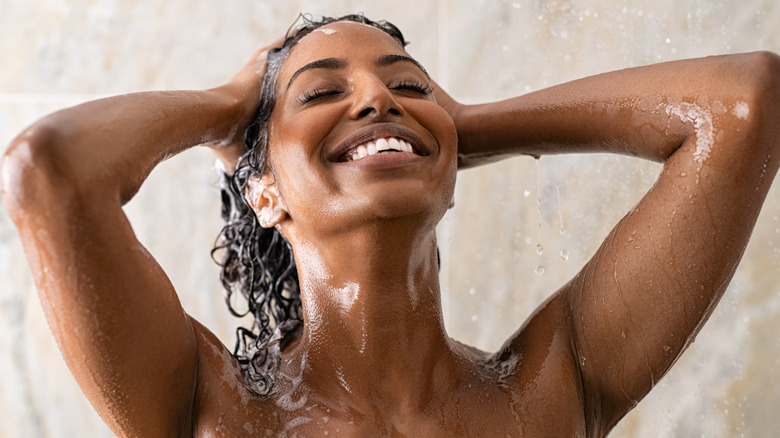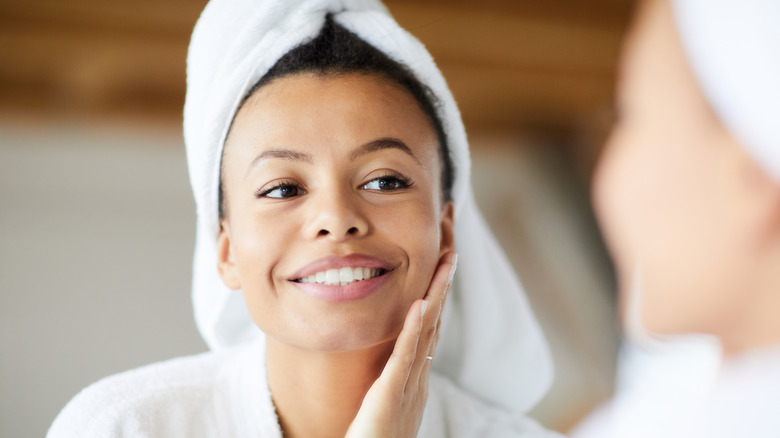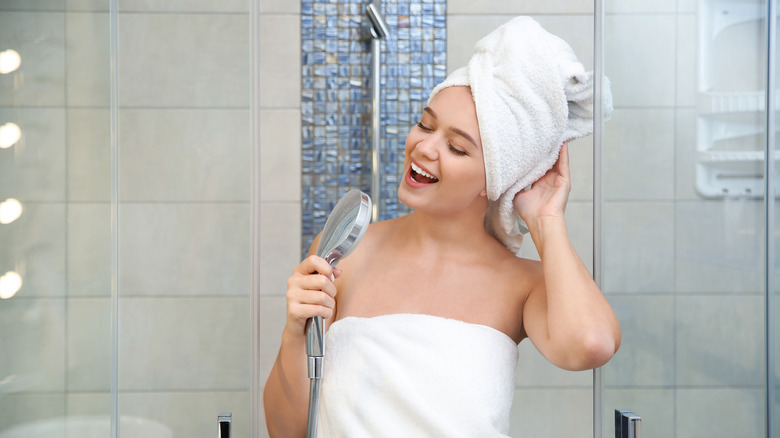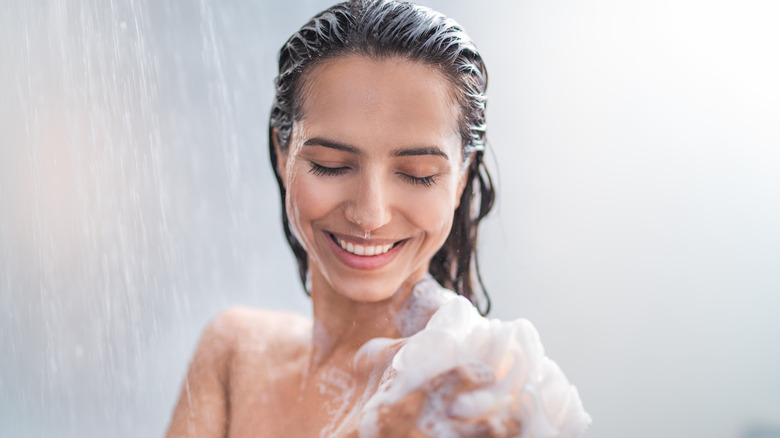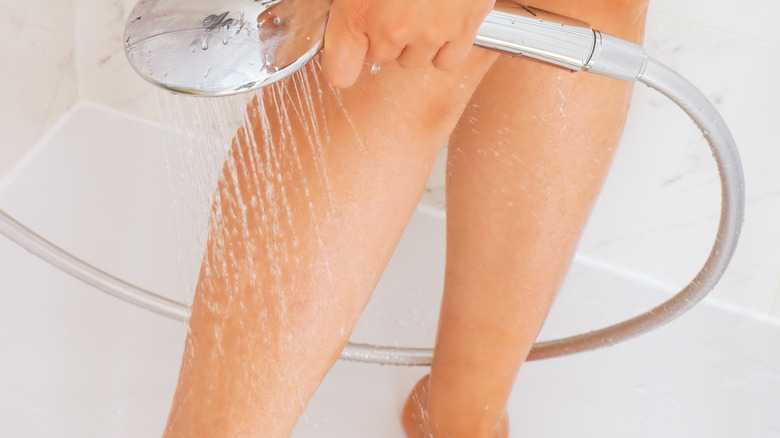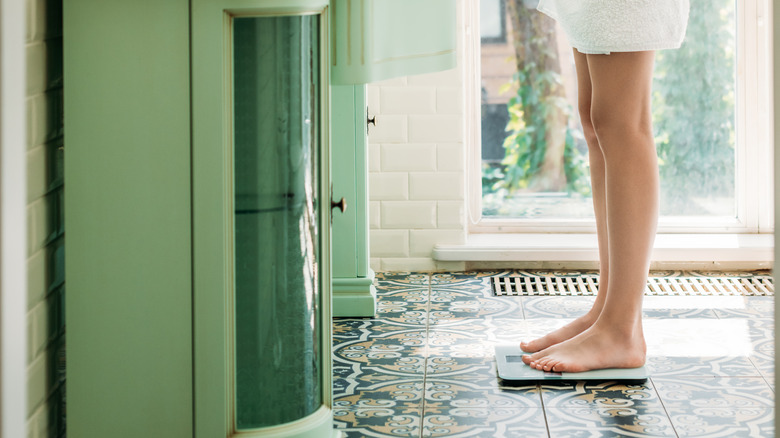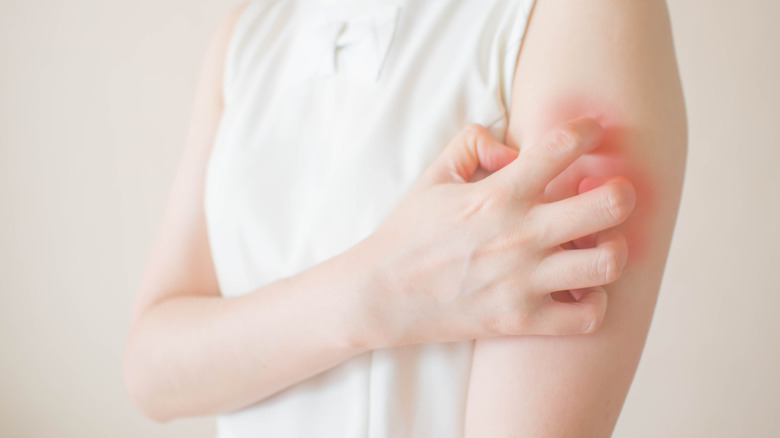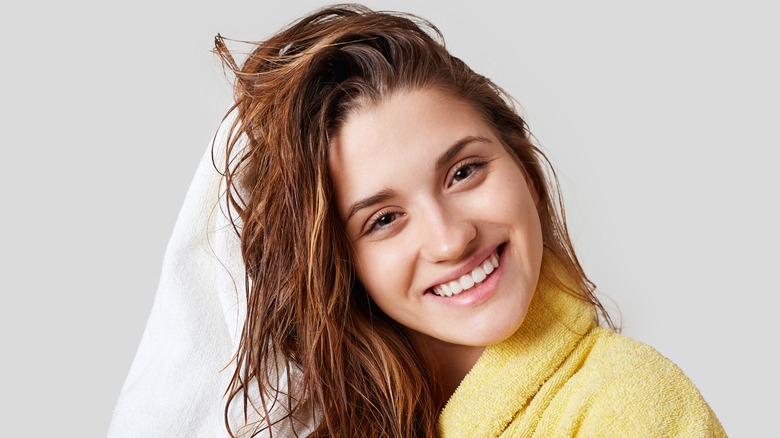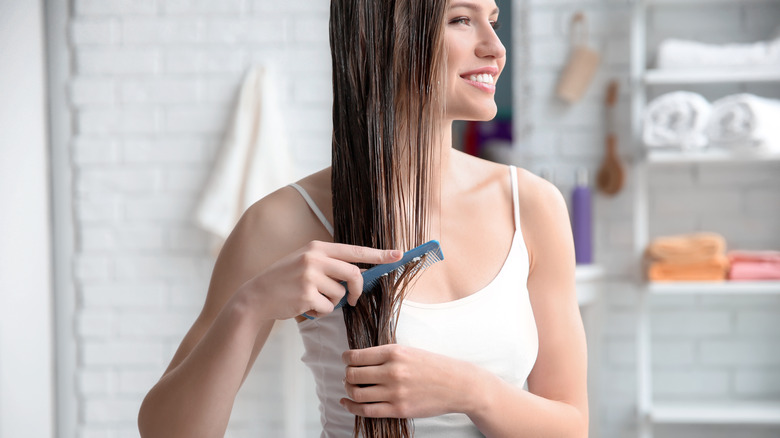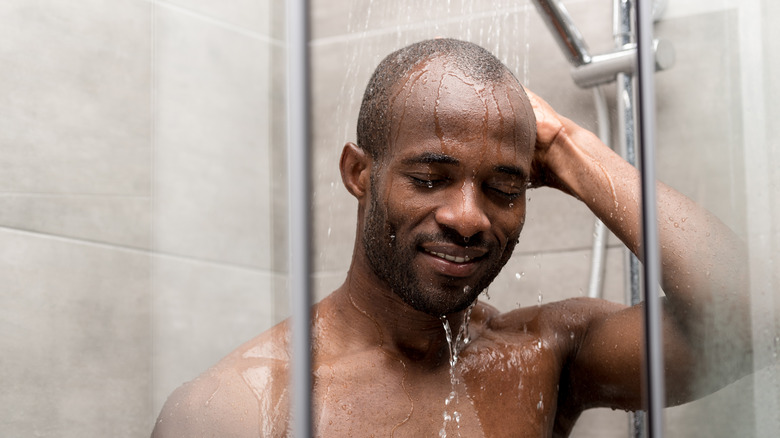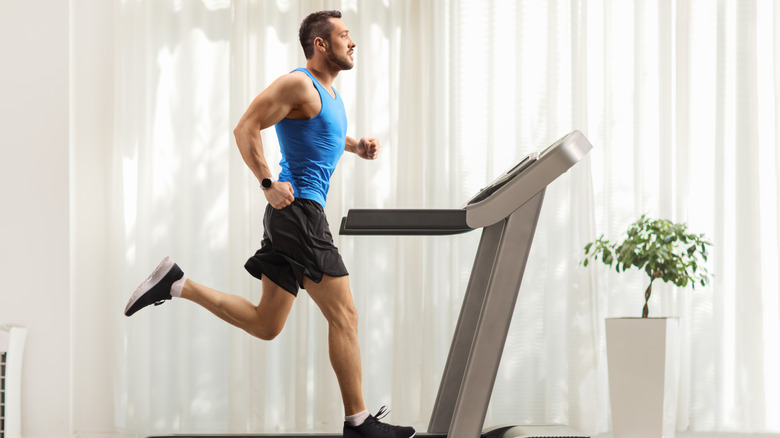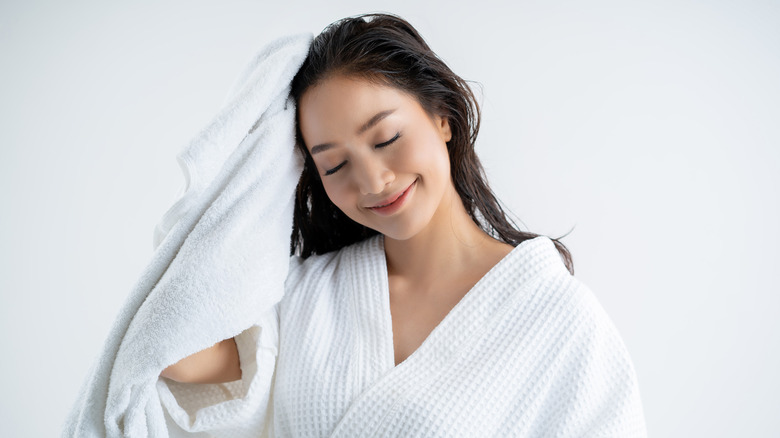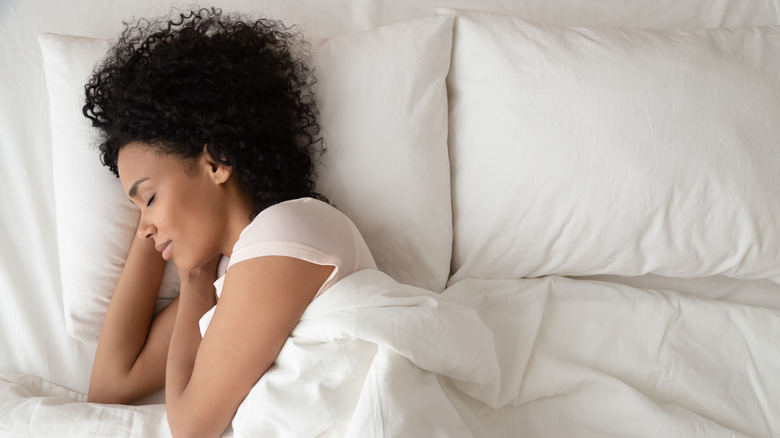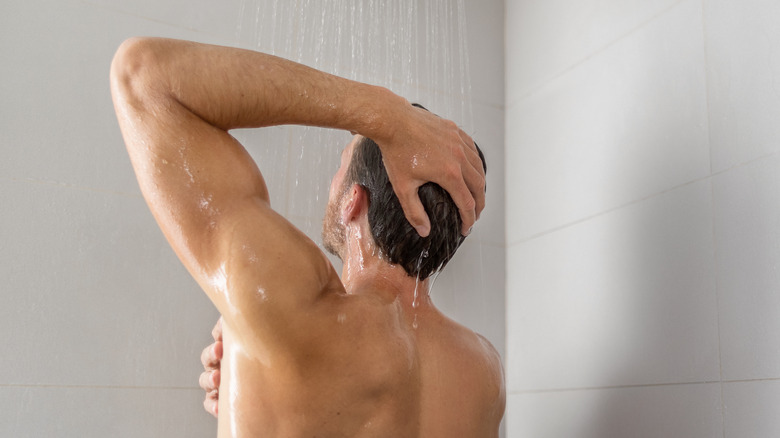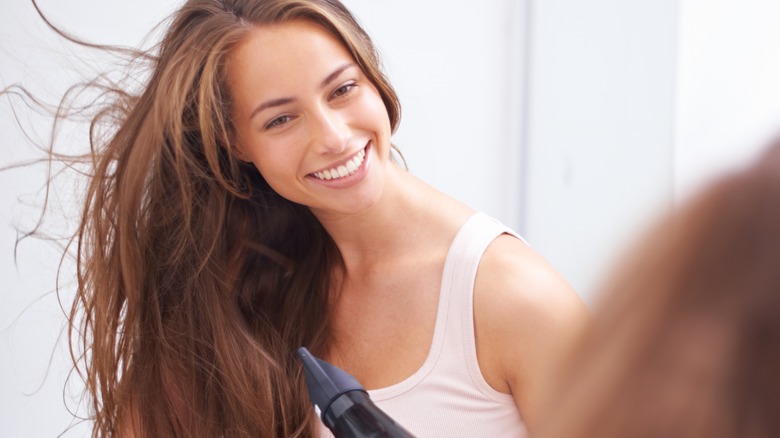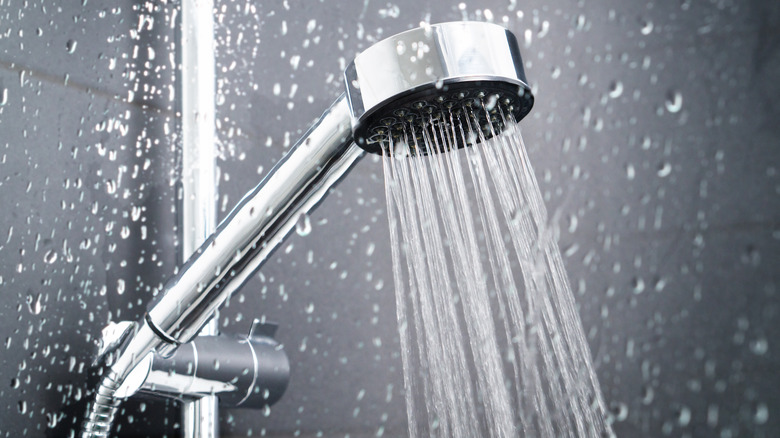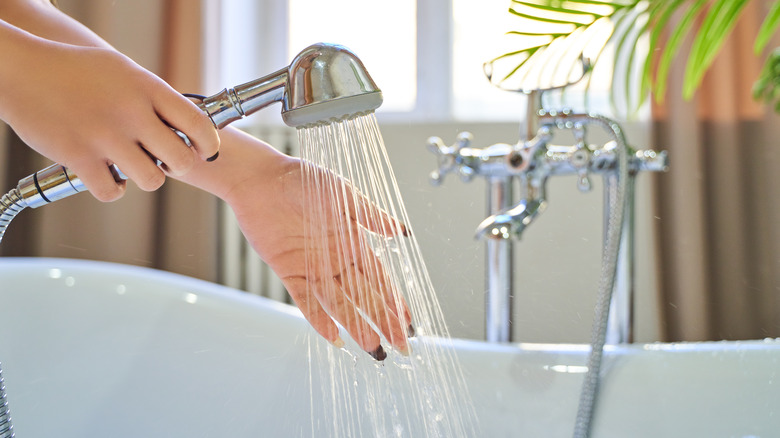The Benefits Of Cold Showers You'll Wish You Knew About Sooner
You shower every day. It is part of your morning or evening routine. A quick splash, some soap, and warm water — that should do the trick, right? Well, as it turns out, you could be missing a daily opportunity for some major physical, mental, and psychological benefits when you turn down the temperature of your shower water. As Dutch athlete Wim Hof told Mind Body Green, "A cold shower a day keeps the doctor away." Yes, a cold shower could do a whole lot more good for you in terms of your health. It can help improve your skin, blood flow, and improve your mental health — and that's just for starters.
Thinking about taking the polar plunge — or, rather, rinse? It won't necessarily be pleasant, but you will likely eventually get used to the nippy jolt. Either way, you are going to wish you knew about these cold-shower perks sooner.
Taking a cold shower can wake you up faster
That third (okay, fourth) cup of morning coffee might not be necessary. It turns out that waking up and feeling bright-eyed and bushy-tailed can be accomplished in a much less caffeinated way. Just hop into a freezing cold shower to shock yourself into a state of alertness.
Dermatologist Michele Green told Well+Good, "Cold showers wake up your skin receptors, which causes increased activity to the brain." And that can subsequently "increase the serotonin levels that help improve mental acuity." In other words, you'll be sharper and more on top of your game when you emerge from some temporary icy torture. Dermatologist Kavita Mariwalla confirmed in the same article that while, yes, initially surprising, "it feels invigorating, almost like a jolt of energy."
Mariwalla recommends enduring the cold water for a minimum of two minutes and a maximum of 15 (if you can endure that length of time). Don't worry, those of us who aren't able to manage even 120 seconds can still benefit from a quick arctic-like blast. Mariwalla said that if you take a lukewarm shower followed by a 30 second cold rinse, you'll still reap some benefits.
Cold showers will give you a mood boost
Of course, you might dread the thought of purposely exposing yourself to cold water first thing in the morning. It's not exactly a way to gradually ease into the day. Nevertheless, doing so might be worth it due to its mood-boosting effects alone. The idea is that not only will you be more awake, you'll also be more chipper and ready to take on the day. What's more, it could naturally help to reduce anxiety and depression.
Research published in Medical Hypotheses sought to prove that since "exposure to cold is known to activate the sympathetic nervous system," increase those feel-good endorphins, and "send an overwhelming amount of electrical impulses" to the brain's nerve endings," taking a cold shower once or twice a day would "result in an anti-depressive effect."
While the study was limited in the number of participants, the daily activity was found to, indeed, have a positive effect on mood. It should be noted that no one was specifically diagnosed with clinical depression, so more research and follow-up is needed. Still, it certainly appears that a cold shower can put a pep in your step — if not a shiver through your body!
Cold showers may reduce overall stress levels
A cold shower will result in an increase of beta-endorphins and noradrenaline, leading to an overall feeling of contentment. Similarly, your level of cortisol will be reduced, a study published in The European Journal of Applied Physiology explained. Cortisol is the fight-or-flight hormone that activates when you're feeling intense acute stress. When cortisol levels are too high, there are a host of potential health consequences, including hypertension (aka high blood pressure), type 2 diabetes, and general fatigue, according to Medical News Today.
So how can you get the de-stressing cortisol-lowering effect of a cold shower? Citing several studies, Inc. reported that it can be as simple as enduring 30 seconds of total immersion in 38-degree Fahrenheit water. Of course, it should be considered that you might face a momentary surge of stress before you turn on the faucet. No one relishes the idea at first, but once this daily ritual becomes habit, you should eventually get used to it.
A cold shower could improve your circulation
Want to get your blood pumping and increase your circulation? Hit the showers — but make it a cold one. As noted by Healthline, when brisk H20 reaches your legs and arms, it "constricts circulation on the surface of your body." This makes the blood in your deep tissues move more efficiently, ultimately helping to regulate your core body temperature. In the same vein, a cold shower can help to reduce overall inflammation in the body and help with any swelling, per Medical News Today.
Still not sure your naked body can handle a barrage of ridiculously cold water? There are a few other water therapy options you can try. For starters, you could opt for a more gradual approach, starting with lukewarm water and then gradually dropping the temperature in an attempt to acclimate your body. You could also try going for a brief swim in a brisk pool, but be sure to talk to your doctor before starting this type of cold-water immersion regimen, and take precautions to warm yourself up right away — hypothermia is a real risk (via Healthline).
Cold showers may help speed up your metabolism
Your metabolism controls the process of turning the food you eat into the energy your organs need to properly function. Having a faster metabolism, means that your body is more readily able to burn calories. On the other hand, if you have a slow metabolism, your body stores these additional calories as fat (via Healthline).
There are a few ways to naturally boost your metabolism. Exercising, eating lean protein, and getting quality sleep are a few simple suggestions, per Healthline. But there is another way you can give your system a little metabolic jolt — you guessed it: a cold shower. Gastroenterologist Niket Sonpal told Well+Good, "Cold showers ... make it so that your body has to heat up to regulate its temperature." When you shiver, your body is trying to get back to a state of warmth — and this natural reaction burns calories.
Furthermore, a study published in Scientific Reports found that exposure to cold temperatures can transform fat cells into brown fat, which helps to incite the speedy burning of calories.
Cold showers may provide your skin with some relief
Michelle Henry, a dermatologist and dermatologic surgeon, told Well+Good that cold water is the way to go for those who have itchy, scaly skin. "Hot water strips the skin of moisture, which can lead to dryness and the exacerbation of eczema." A cold rinse, on the other hand, can help you find some quick relief. NYU Langone Health's Dr. Tania Elliott told NBC's Today, "From a physiological standpoint, your nerves can't transmit multiple sensations at the same time. So if you're itchy and you're cold at the same time, one of those two things is going to take over. Typically the cold sensation will override the itch."
If you can't commit to making the cold-shower switch, at least vow to forgo the extreme heat. Jessica J. Krant, SUNY Downstate assistant clinical professor of dermatology, told Everyday Health that "the temperature of the water should be turned down two notches from where you want it to be." That is, "warm enough to be tolerable, but not hot enough to make it feel good," she continued.
Your skin might look younger after a cold shower
Before a big meeting or date night, you might try a DIY mask in an effort to give your skin a boost. But a quick cold shower may be even more effective in making your skin look radiant and youthful.
Dermatologist Michele Green told Well+Good, "A cold shower tightens the pores and it also seals in moisture." She elaborated that this causes the blood vessels to tighten, which can potentially result in calmer, "less inflamed" skin. As noted by Health Status, the cold water can also reduce facial swelling and even diminish the appearance of dark under-eye circles.
Kavita Mariwalla, a New York-based dermatologist offered a bit of perspective, though. "As a go-to beauty trick, cold showers are easy to do and have an immediate effect," she told Well+Good. "However, the effect will not be for the entire day." In short, running your face under the shower head will temporarily help, but it won't suddenly cure all of your skin woes.
You'll have great hair days when you start taking cold showers
Have you ever been asked if you want a cold rinse at the end of a salon shampoo session? If so, there's a good reason for this primping practice. It could help prolong your blowout and enhance your hair health. Jessie Cheung, a Chicago-based dermatologist, explained to Health that "the cold will flatten the ruffled cuticles" of your hair strands "and lock in moisture to prevent breakage." To get the fringe benefits (get it?), you don't have to expose yourself to the chilly water very long. Dr. Cheung said that "a short blast — aim for at least 10 seconds — at the end of your shower will do."
Not convinced? In an article in Self, dermatologist Kally Papantoniou shared an argument against hotter temperatures: "Using warm water can dissolve lipids and remove most of the conditioners that you added in." Unless you rinse with cold water, your conditioning treatments won't do your hair — nor your wallet — much good.
Cold showers could be good for your immune system
A hot shower might help with congestion, but a cold one might be able to prevent a stuffy nose in the first place. It's still up for debate in the medical community, but it's conceivable that exposure to a brisk rinse-off can be good for your immune system.
A study published in PLoS One explained over 3,000 participants between the ages of 18 and 65 were assigned to a control group or a daily 30-, 60-, or 90-second cold shower for one month. The results revealed that those who took a cold shower every day were less frequently absent from work due to illness. The researchers indicated, however, that while the cold showers reduced the likeliness of work absence by 29 percent, sickness itself was not significantly decreased. In other words, the cold shower may have diminished symptoms, enabling people to feel at least well enough to report to work. Many of these people also reported an enhanced quality of life, increased productivity at work, and reduced anxiety.
However, if you are already under the weather, maybe skip the cold water; it might "be too hard on your immune system," and it's better to "ease into the cooler temperatures," noted Healthline.
Taking cold showers will help you bounce back faster after an intense workout
If you have been hitting the gym hard, you've undoubtedly also been hitting the showers. Yes, that step is important to eradicate germs, sweat, and body odor. Plus, "soothing jets of water can help keep lactic acid from getting trapped in sore muscles," which will help you recover faster from such a vigorous workout, according to Healthline. While a hot shower might sound amazing, a cold one could potentially be more beneficial.
A study in Sports Medicine indicated that cold water immersion is "likely to assist recovery of exercise performance more than HWI [hot water immersion]." Furthermore, research published in the Journal of Athletic Training indicated that those suffering the effects of heat stroke after exercise could turn to a cold shower as an immediate answer, although full-body immersion via a bath appeared to be even better.
You may experience less pain and muscle soreness after a cold shower
Aches and muscles soreness go with the territory of everyday life. If you hunch over a computer for hours at work or have ever slept in an odd position overnight, chances are you've dealt with minor — or even major — back, neck, and body pain.
As noted by a study published in the North American Journal of Medical Sciences, cold hydrotherapy is an old and effective type of treatment for many different ailments. One finding is that it can help to "diminish fatigue by reducing muscle pain."
However, as noted by Healthline, hot showers have also been shown to reduce tension and relax muscles — so maybe give both options a go and see how your body feels. If you're really brave, you could try a contrast shower. Developed by Dr. Sebastian Kneipp, this method involves rinsing in very cold water for 60 seconds, and then turning up the heat for another minute.
Cold showers may improve your overall sleep
If a cold shower can help to wake you up and make you more alert, how could taking a brisk rinse-off before hitting the hay also improve the odds of getting a good night of Zzzs? It certainly sounds counterintuitive, but this might be the case.
As explained by The Week, your body temperature is a major factor contributing to both your sleep latency — that is, how long it takes to conk out when your head hits the pillow — and your sleep quality. People tend to sleep better when they are not overheated. In fact, lowering your body temperature can help you fall asleep faster and stay asleep longer. Research cited by the article noted that people reported sleeping better when they did things that made them feel cooler and more comfortable before going to bed — taking a cool shower, lowering the thermostat, et cetera.
Cold showers can have an effect on your cardiovascular system
Want to help you heart? Take a cold shower. Or maybe don't. Dr. Abigail Rickard, an associate professor at the University of Greenwich in London, told HuffPost, "The effects of cold showers are positive for the cardiovascular system." She elaborated, saying that while a cold shower might initially make you gasp in shock, it'll also get your blood pumping strong. "You've got a lot of blood in the center of your body, primed because it's got lots of oxygen meaning that your brain, your heart and your lungs are working at their optimum," she continued.
For this same reason, though, if you have or are at risk for cardiovascular disease or have a history of heart complications, you should skip the cold shower altogether. Professor Helene Glassberg of the University of Pennsylvania's Perelman School of Medicine told Today that the sudden exposure to extreme cold could be dangerous for these people. "Abrupt exposure to cold water causes your blood vessels to restrict, causes you to take a deep breath, causes your heart rate and blood pressure to potentially go up and this could potentially cause a stressor on the heart," she divulged.
Taking cold showers could make your scalp and hair healthier
When the actress and musician Alicia Witt went through chemotherapy for breast cancer earlier this year, she wore what's known as a "cold cap" to prevent chemo-related alopecia, according to Boston. By cooling the scalp during chemo infusion, the cold cap has been proven to help reduce the amount of hair lost, according to a 2015 study published in the International Journal of Dermatology. It's a novel technique — but it's not really a novel notion that keeping one's scalp cool can be beneficial to scalp health, which, in turn, could lead to healthier hair (via Mind Body Green).
"Cold water, unlike hot water, does not dry out the naturally lubricated barrier that provides protection for your skin and hair, known as the sebum layer," which, of course, is better for scalp and hair health, according to celebrity hairstylist Annagjid "Kee" Taylor (via Mind Body Green). Cold water also leaves the hair's cuticle sealed, unlike hot water, according to another celebrity hairstylist, Andrew Fitzsimons, who says the result will be "stronger, healthier hair over time" (via Mind Body Green). In fact, Fitzsimons recommends that if you can't bring yourself to take a full-on cold shower, you might at least consider using cold water when washing product out of your hair to get some of the benefit. That being said, for the best and most thorough shampoo, dandruff shampoo manufacturer Head & Shoulders recommends warming up the water a bit while lathering up.
Know the risks of taking a cold shower
While the benefits of a cold shower are plentiful for the mind, body, and psyche, the shiver-inducing daily ablution isn't necessary or recommended for everyone. As highlighted, those with heart issues should avoid the extreme water temperature. As noted by Diabetes Daily, the "cold water feels like a shock" and can cause a spike in heart rate, breathing difficulty, and potential dizziness.
Physician and author Andrew Weil also advised those with high blood pressure to forgo the frigid water — or, at least, talk to a doctor before giving it a go. "Low temperatures (including cold weather) constrict blood vessels. As a result, blood pressure rises because more pressure is needed to force blood through narrowed blood vessels," he explained on his site.
Furthermore, while a cold shower can be a good habit to address some health issues, one should not expect it to be a cure-all or a remedy to replace other treatments. Again, when in doubt, it's always a good idea to consult your doctor.
How to ease yourself into a routine of taking cold showers
Although board-certified dermatologist Ava Shamban notes that cold showers can reduce inflammation, she also makes the point that not everyone is going to feel equally comfortable in a cold shower. "If you're new to the practice," she advises via Mind Body Green, "a freezing shower might be shocking for a few seconds, but it should never feel severely uncomfortable." So, bearing that in mind, it may be best to ease into the cold shower habit. Healthline recommends starting with the water just slightly cooler than you're used to, and then gradually decreasing the temperature until you're juuust past your comfort zone. Then try to stick with it for two to three minutes, remembering to breathe deeply to help calm the mind.
Next time, repeat the process, but start from a colder temperature and try to last another minute or two. Healthline suggests that by repeating this process each time you shower, by the seventh to tenth time, you may actually even find yourself looking forward to lowering the temperature. Per seasoned cold shower-partaker Jamie Jackson, who blogs at Medium, if you're thinking about adopting a cold shower routine, it's best to do it as soon as possible because the more you think about it, the more you may come to dread it — and it's not dreadful, according to Jackson. In addition, Jackson advises just accepting that it your cold shower is, indeed, going to be cold.

